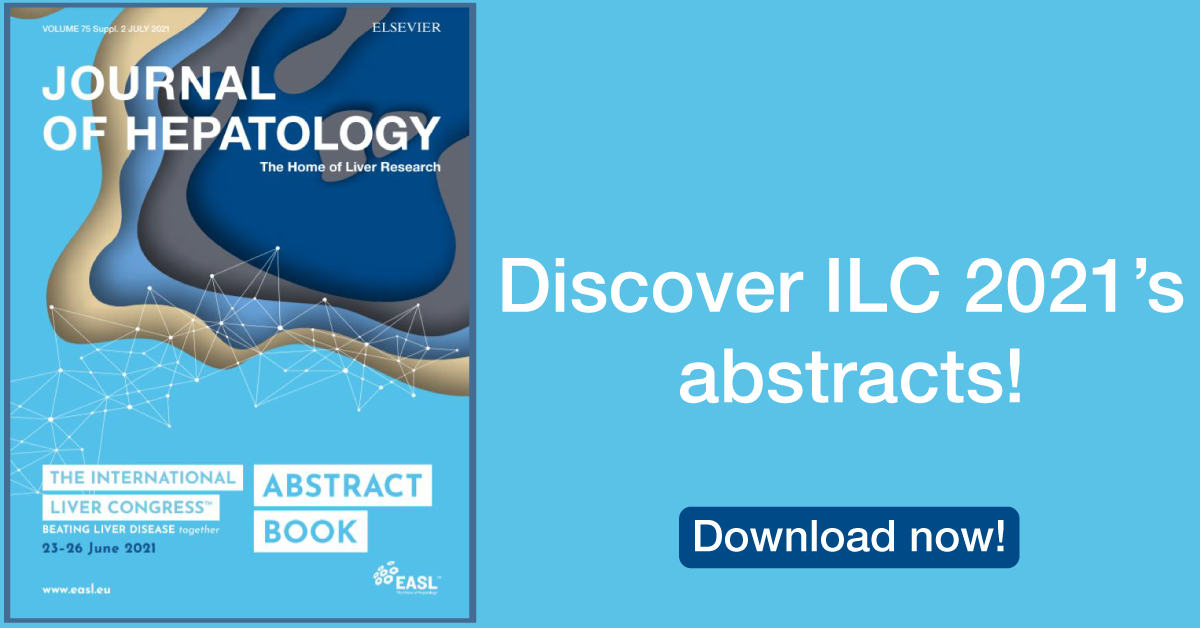ILC 2021 Abstract Book
Discover all the accepted abstracts for ILC 2021 from both rounds of submissions. Read and download the Abstract Book, to get an overview of the cutting-edge science being shared at the congress.
ILC 2021 abstract deadlines
- First round, abstract submission deadline: 02 February 2021 (23.59 CET)
- First round, abstract notification: 02 April 2021
- Poster submission deadline: 14 June 2021
- Second round, regular and high-profile, late-breaker abstracts submission period: 10– 27 April 2021
- Second round, late-breaker notification: 18 May 2021
Important information
Those abstract presenters who took part in the first round and who were selected are eligible to register with early fees. They will receive a personal code for the early-fee discount, together with the abstract notification. Their final early-fees deadline is: 12 April 2021, 23:59 CET.
Those abstract presenters who took part in the second round will have ten days after receiving their notification on 18 May to register with early fees. They will receive a personal code for the early-fee discount, together with the abstract notification. Their final early-fees deadline is: 28 May 23:59 CET.
Waivers for submitters from 29 countries defined as low-income economies
Abstract submitters from low-income economies* will be exempted from the EUR 50 required to submit their abstract(s). If you are from one of these countries, you can submit your abstract cost-free.
*As per the World Bank classification:
Low-income economies refers to this listing of these 29 countries: Afghanistan, Burkina Faso, Burundi, Central African Republic, Chad, Congo Dem. Rep, Eritrea, Ethiopia, Gambia The, Guinea, Guinea-Bissau, Haiti, Korea Dem., People's Rep., Liberia, Madagascar, Malawi, Mali, Mozambique, Niger, Rwanda, Sierra Leone, Somalia, South Sudan, Sudan, Syrian Arab Republic, Tajikistan, Togo, Uganda, Yemen Rep.
ILC 2021 full list of abstract categories
Click and discover all the categories.
- Acute liver failure and drug induced liver injury
- Alcoholic liver disease
- Cirrhosis and its complications (1): Portal Hypertension
- Cirrhosis and its complications (2): ACLF and Critical illness
- Cirrhosis and its complications (3): Other clinical complications except ACLF and critical illness
- Cirrhosis and its complications (4): Experimental and pathophysiology
- Fibrosis
- Gut microbiota and liver disease
- Imaging and drug targeting
- Immune-mediated and cholestatic disease: Clinical aspects
- Immune-mediated and cholestatic: Experimental and pathophysiology
- Immunology
- Liver development, physiology and regeneration
- Liver transplantation and hepatobiliary surgery: Clinical aspects
- Liver transplantation and hepatobiliary surgery: Experimental
- Liver tumours: Clinical aspects except therapy
- Liver tumours: Experimental and pathophysiology
- Liver tumours: Therapy
- Molecular and cellular biology
- NAFLD: Clinical aspects except therapy
- NAFLD: Diagnostics and non-invasive assessment
- NAFLD: Experimental and pathophysiology
- NAFLD: Therapy
- Non-invasive assessment of liver disease except NAFLD
- Nurses and Allied Health Professionals research in hepatology
- Public Health
- Rare liver diseases (including paediatric and genetic)
- Viral Hepatitis A, B, C, D, E: Virology
- Viral hepatitis A/E: Clinical aspects
- Viral hepatitis B/D: Clinical aspects except therapy
- Viral hepatitis B/D: Therapy
- Viral hepatitis C: Clinical aspects except therapy
- Viral Hepatitis C: Post SVR and long term follow up
- Viral hepatitis C: Therapy and resistance
Abstract submission information
Types of presentations
All accepted abstracts, submitted as regular abstracts or late-breakers, will then be presented either as:
- an oral presentation or
- a poster presentation
The best posters will be selected for ePoster sessions and the authors will be notified at the end of May 2021.
Instructions on how to prepare your oral or poster presentation will be provided shortly.
Oral and poster presentation templates
Once your research has been accepted, you can use the following oral and poster presentation templates. You are allowed to use your own templates, as long as they follow the requested oral presentation and poster presentation formats.


